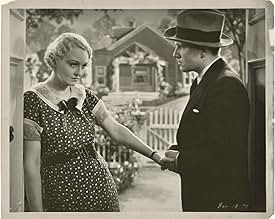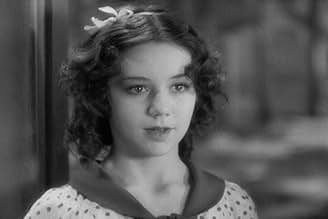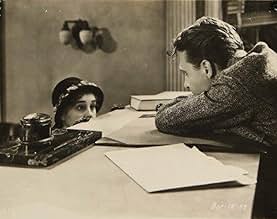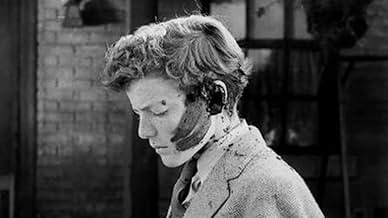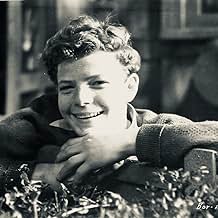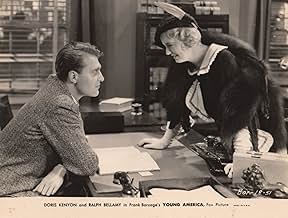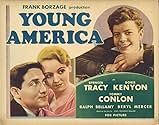Aggiungi una trama nella tua linguaAlready in trouble with the law, Arthur and his friend Nutty break into a drugstore to get medicine for Nutty's grandmother. The druggist's wife, Mrs. Doray, asks for custody. When he hears ... Leggi tuttoAlready in trouble with the law, Arthur and his friend Nutty break into a drugstore to get medicine for Nutty's grandmother. The druggist's wife, Mrs. Doray, asks for custody. When he hears them arguing over him, Arthur runs away. When he returns Mr. Doray is being held up by ban... Leggi tuttoAlready in trouble with the law, Arthur and his friend Nutty break into a drugstore to get medicine for Nutty's grandmother. The druggist's wife, Mrs. Doray, asks for custody. When he hears them arguing over him, Arthur runs away. When he returns Mr. Doray is being held up by bandits at the drugstore.
- Premi
- 1 vittoria in totale
- Arthur Simpson
- (as Tom Conlon)
- Mabel Saunders
- (as Dawn O'Day)
- Maid
- (non citato nei titoli originali)
- Schoolteacher
- (non citato nei titoli originali)
- Aunt Mary's baby
- (non citato nei titoli originali)
- Cassie Taylor
- (non citato nei titoli originali)
- Undetermined Role
- (non citato nei titoli originali)
- Bull Butler
- (non citato nei titoli originali)
- Bandit
- (non citato nei titoli originali)
- Court Clerk
- (non citato nei titoli originali)
- Bandit
- (non citato nei titoli originali)
Trama
Lo sapevi?
- QuizThe world premiere showing was at the Harmanus Bleeker Hall theatre in Albany, New York on 8 April 1932. (Albany Times-Union, 7 April 1932)
- Citazioni
Judge Blake: Washington Lincoln Jackson?
Washington Lincoln Jackson: Yes, sir.
Judge Blake: Have you ever been here before?
Washington Lincoln Jackson: No sir. And I wouldn't be here now 'lessin' I was forced to come.
Judge Blake: I suppose you know why Officer Weems arrested you.
Washington Lincoln Jackson: Yessir. Because I was the smallest kid he could catch.
- ConnessioniRemake of Young America (1918)
The director's on-screen surrogate is Ralph Bellamy, introduced in the opening sequence as a progressive judge who makes it his business to listen to the boys, find out why they misbehave, and dole out appropriate sentences. He's fair but no pushover, and when one well-dressed boy smoothly delivers his testimony with a grin he astutely identifies the kid as a con artist. You know Bellamy's judge is a good guy from the way he sits at the judicial bench: he isn't ramrod straight, he slouches, parks his elbow on the desktop and props his head on his hand, listening intently as he leans towards the speaker. If you ever get in trouble and wind up in court, this is the kind of judge you'd want to face.
The central figure is an orphaned boy named Arthur Simpson, who is being raised in squalor by a cold-hearted aunt with no husband and three children of her own. Art is in trouble constantly, but his motives are usually good onesso much so that, after a while, our credulity is strained. A well-heeled lady named Edie Doray takes a sympathetic interest in the boy and volunteers to take him into her home as her ward, despite the vocal opposition of her perennially grouchy husband Jack, the proprietor of a drug store. After various complications and much suffering for young Art, who seems to be a magnet for trouble, the boy redeems himself (in a wildly implausible, action-packed finale) and everyone, even Jack Doray, comes to recognize his good qualities.
"Young America" starts well and holds viewer interest much of the way, but problems kick in around the midway point as the story turns increasingly improbable and sentimental. Tommy Conlon is quite good as Arthur Simpson, but the character as written is impossibly noble, forever misunderstood and put-upon. In the face of injustice Art maintains a disturbing, Job-like passivity. Several times the locals refer to him as "the worst boy in town," and if that's true they're awfully lucky. Mickey Rooney's character in "Boy's Town" is more of a hardened troublemaker than this guy. Most kids in Art's position would be openly angry and raise a lot more hell than he ever does, and a stronger screenplay might have granted him more nuance, but like Father Flanagan the writers of "Young America" seem to believe there's no such thing as a bad boy (well, except for a couple of bad eggs we meet briefly along the way) and are determined to prove that all these kids need is the opportunity to explain themselves and a second chance in life, and everything will be fine. If only life could be so simple!
Speaking of Father Flanagan the biggest lure this film has to offer modern day viewers is the performance of 32 year-old Spencer Tracy as Jack Doray, the druggist. It's a little strange to see Tracy this young, but the regular-guy gruffness and authoritative voice so familiar from his later movies are present, and he demonstrates with ease that he already had the acting chops to breathe life into an ill-defined character. Tracy was under contract to Fox Films during the first five years of his movie career, 1930-35, and was said to be unhappy with most of the projects he was assigned; it's safe to assume that this was one of the roles he didn't like. We're never told much about Jack Doray. We never learn why he's such a grouch or why he takes an instant dislike to Art Simpson, or for that matter why his wife puts up with him. When, in the final scenes, Doray suddenly sees the light and recognizes Art's goodness, only an actor of Tracy's caliber could make the turnabout feel at all credible.
The finale involves a stick-up by crooks and a crazed car chase staged mostly before rear-projection screens, and it bears so little resemblance to what we've been watching it feels as if it was spliced in from a different movie. (Amusingly, the original posters and lobby cards for the film emphasized this sequence, which must have left more than one ticket-buyer bewildered and disappointed.) It concludes the show on a rousing note, but also reminds us that while "Young America" is a moderately interesting viewing experience it doesn't live up to the promise of its opening scenes.
I più visti
Dettagli
- Tempo di esecuzione1 ora 10 minuti
- Colore
- Proporzioni
- 1.37 : 1
Contribuisci a questa pagina


